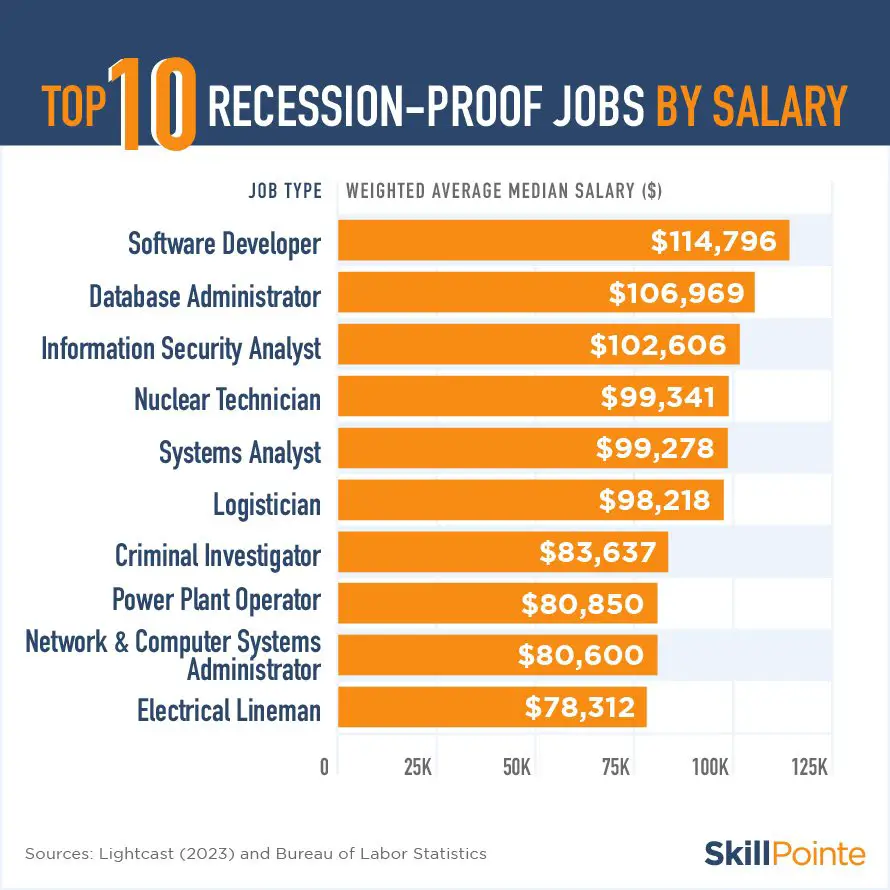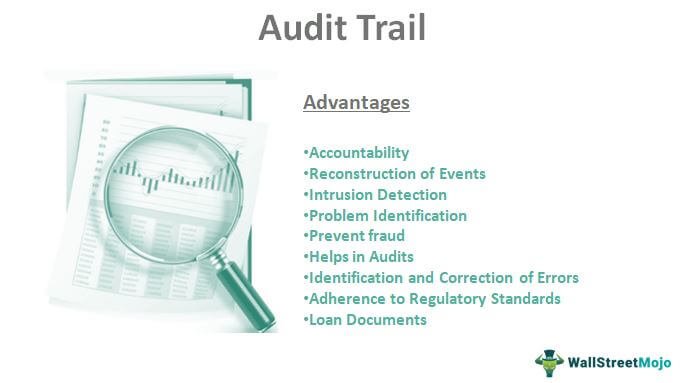In uncertain times, when the economy takes a downturn and job security becomes a concern, the question on everyone’s mind is: what is a recession-proof job? Well, the good news is that there are indeed certain professions that tend to weather economic storms better than others. These are the jobs that remain in demand, no matter the economic climate, providing stability and security to those who hold them. So, if you’re looking for a career path that can withstand the ups and downs of the economy, keep reading. We’ll explore some recession-proof jobs that you might want to consider.
What is a Recession-Proof Job?
In today’s uncertain economic climate, many people find themselves concerned about job security. The fear of losing a job during a recession is a legitimate concern, as history has shown us that economic downturns can lead to widespread layoffs and job losses. However, there are certain occupations and industries that are more resilient and less affected by recessions. These are known as recession-proof jobs.
A recession-proof job refers to a career or profession that remains stable or even thrives during economic downturns. These jobs are typically in industries that provide essential products or services that people need regardless of the state of the economy. While no job is completely immune to the impact of a recession, recession-proof jobs have qualities that make them more resistant to economic fluctuations.
Qualities of Recession-Proof Jobs
Recession-proof jobs share several characteristics that make them more likely to withstand economic downturns. These qualities are often linked to the industry or sector in which the job is situated. Here are some key qualities of recession-proof jobs:
- Essential Services: Jobs in industries that provide essential services are typically recession-proof. Examples include healthcare, utilities, food, and transportation. Regardless of the state of the economy, people still require these services to meet their basic needs.
- Steady Demand: Recession-proof jobs are in sectors with a consistent and steady demand. These jobs are less influenced by consumer spending habits and market volatility. For example, jobs in education, government, and public safety tend to remain stable during economic downturns.
- Limited Automation: Jobs that involve complex tasks and require a high level of human expertise are less likely to be automated. Occupations that rely heavily on human skills and creativity, such as healthcare professionals, engineers, and skilled tradespeople, are often recession-proof.
- Flexible Industries: Certain industries have the ability to adapt and adjust to changing economic conditions. For instance, the technology sector has consistently proven to be resilient during recessions as it evolves and innovates to meet new demands.
- Long-Term Stability: Jobs in industries that have a long history of stability and growth tend to be more recession-proof. These industries have weathered economic downturns in the past and are often better equipped to handle future recessions.
Examples of Recession-Proof Jobs
While there is no foolproof list of recession-proof jobs, some occupations have proven to be more resilient than others during times of economic uncertainty. Here are some examples of recession-proof jobs:
Healthcare Professionals
The healthcare industry has long been considered recession-proof due to its vital role in society. Regardless of the economic situation, people require medical care and attention. Jobs such as doctors, nurses, pharmacists, and medical technicians are in high demand and likely to remain stable even during challenging times.
Educators
Teaching is another recession-proof profession as education remains a societal priority. Teachers at all levels, from primary school to higher education, play a crucial role in shaping future generations. The demand for qualified educators remains steady, ensuring job security in the field.
Government Workers
Government employees, including those working in public administration, law enforcement, and public transportation, often enjoy greater job security during recessions. These roles are essential for maintaining the functioning of society and are less susceptible to layoffs and budget cuts.
Utility Workers
Jobs in the utilities sector, such as electricians, plumbers, and water treatment specialists, are also considered recession-proof. These services are essential for daily living and are not subject to significant fluctuations based on economic conditions.
Information Technology Professionals
As technology continues to advance rapidly, the demand for skilled IT professionals remains high. Jobs in software development, cybersecurity, and data analysis are less likely to be affected by economic downturns and often offer long-term stability.
Social Workers
Social workers and counselors play a critical role in supporting individuals and communities. Their services are essential during times of economic hardship and are often in increased demand. Jobs in the social work field provide a sense of stability and job security.
Energy Industry Workers
The energy industry, including renewable energy sectors, offers recession-proof job opportunities. As the world’s energy needs continue to grow, professionals in this field are likely to maintain job security and stability, regardless of economic conditions.
Skilled Tradespeople
Skilled tradespeople, such as carpenters, plumbers, electricians, and mechanics, are essential for maintaining infrastructure and providing necessary services. These jobs require specialized skills that are not easily automated, making them recession-proof.
Accountants and Auditors
Financial management is crucial for both individuals and organizations, regardless of the state of the economy. Accountants and auditors play a vital role in ensuring financial stability and compliance. These professionals are in demand during recessions as individuals and businesses seek financial guidance.
Pharmaceutical Industry Professionals
The pharmaceutical industry plays a critical role in providing medications and healthcare products. Jobs in this sector, including researchers, pharmaceutical sales representatives, and pharmacists, are typically recession-proof due to the ongoing need for medical treatments.
While no job is completely recession-proof, certain occupations and industries are more resistant to economic downturns. Jobs in essential services, steady-demand sectors, and industries that require specialized skills tend to offer greater job security during recessions. Understanding the qualities of recession-proof jobs can help individuals make informed career choices and navigate uncertain economic times with more confidence. By considering these recession-resistant industries, individuals can increase their chances of finding stability and job security in any economic climate.
Top 6 Recession Proof Careers (Most Stable Jobs)
Frequently Asked Questions
Frequently Asked Questions (FAQs)
What is a recession-proof job?
A recession-proof job refers to a profession or occupation that remains stable and in demand even during economic downturns or recessions. These jobs are typically less affected by fluctuations in the economy and provide employees with a sense of job security.
What are some examples of recession-proof jobs?
Some examples of recession-proof jobs include healthcare professionals (doctors, nurses, pharmacists), teachers, utility workers, government employees, accountants, insurance agents, and IT specialists. These jobs are essential to society and are less prone to layoffs or decreased demand during a recession.
What qualities make a job recession-proof?
A recession-proof job typically possesses certain qualities such as being in a stable industry or sector, being essential to the functioning of society, having a strong demand even during economic downturns, and offering skills that are not easily automated. Jobs in healthcare, education, and public services often possess these qualities.
Why are recession-proof jobs important?
Recession-proof jobs are important because they provide individuals with a higher level of job security, especially during times of economic uncertainty. Having a recession-proof job can help individuals maintain financial stability, reduce the risk of unemployment, and ensure a steady income even during recessions.
What are the benefits of working in a recession-proof job?
Working in a recession-proof job has several benefits, including job security, a steady income, and reduced stress during economic downturns. These jobs often offer better long-term stability and the potential for career growth since they are less affected by market fluctuations.
How can I identify recession-proof jobs?
To identify recession-proof jobs, consider industries that are essential to everyday life and are less likely to be heavily impacted by economic downturns. Look for positions that are less susceptible to automation and that provide services or skills that are consistently in demand, even during recessions.
Are all government jobs considered recession-proof?
While many government jobs can be considered recession-proof due to their stability and essential nature, it is important to note that not all government jobs fall into this category. Some government positions may still be affected by budget cuts or restructuring during economic downturns, so it is advisable to research specific roles within the government sector.
Can recession-proof jobs still be affected by economic downturns?
While recession-proof jobs are generally more stable and less affected by economic downturns compared to other professions, they may still experience some impact during severe recessions or financial crises. However, the impact is usually less significant compared to jobs in industries that are highly sensitive to economic fluctuations.
What skills or qualifications are valuable for recession-proof jobs?
Skills or qualifications that are valuable for recession-proof jobs vary depending on the industry. However, some commonly sought-after skills include healthcare expertise, teaching certifications, specialized technical knowledge, strong analytical abilities, adaptability, and effective communication skills. It is advisable to research specific industries and job roles to determine the most relevant qualifications.
Final Thoughts
A recession-proof job is one that remains stable and in demand regardless of the economic climate. These jobs provide a sense of security and often offer consistent income and job opportunities. In times of economic downturn, recession-proof jobs are more likely to withstand the challenges and uncertainties that come with a recession. By focusing on industries such as healthcare, education, and essential services, individuals can increase their chances of securing a recession-proof job. These jobs provide stability and peace of mind, making them a valuable choice for those seeking long-term career prospects.



